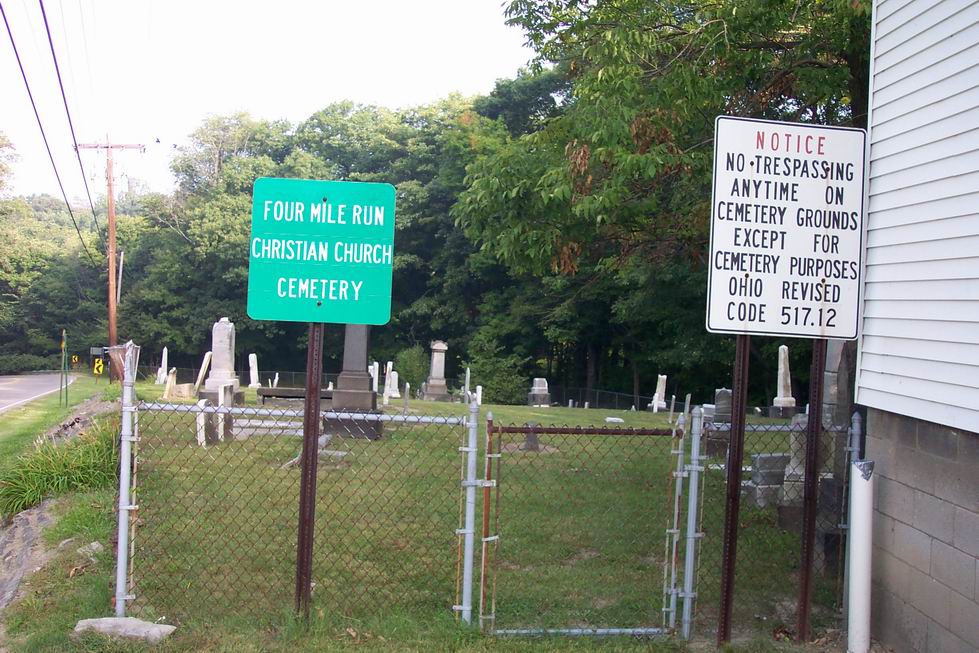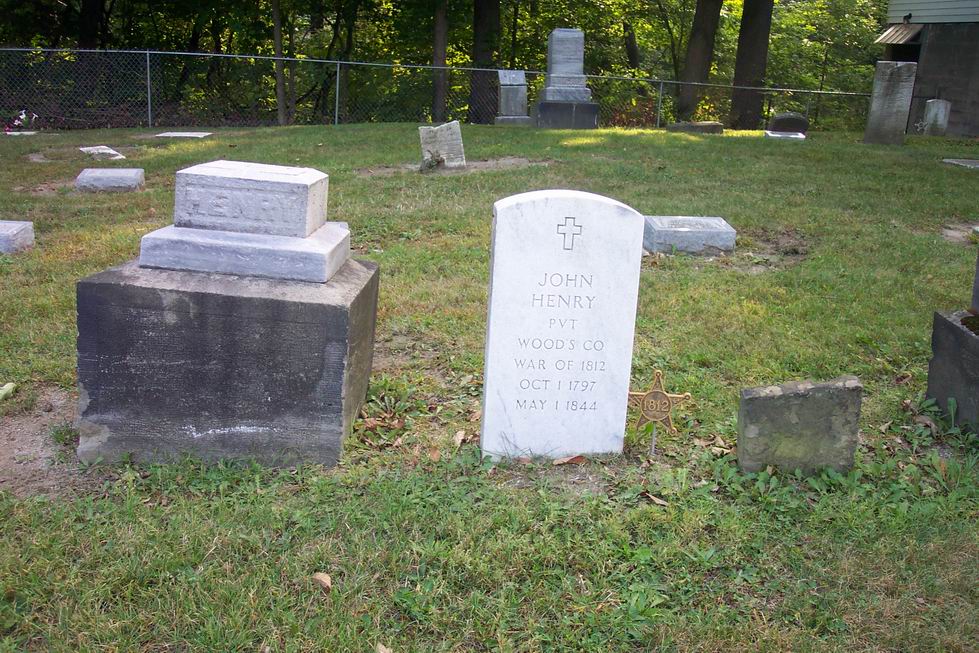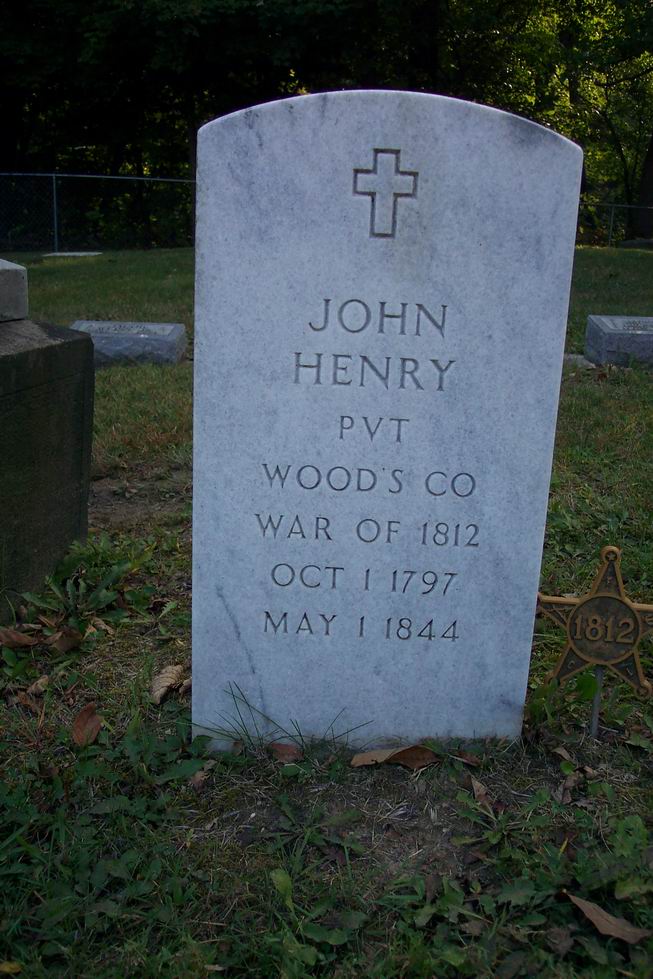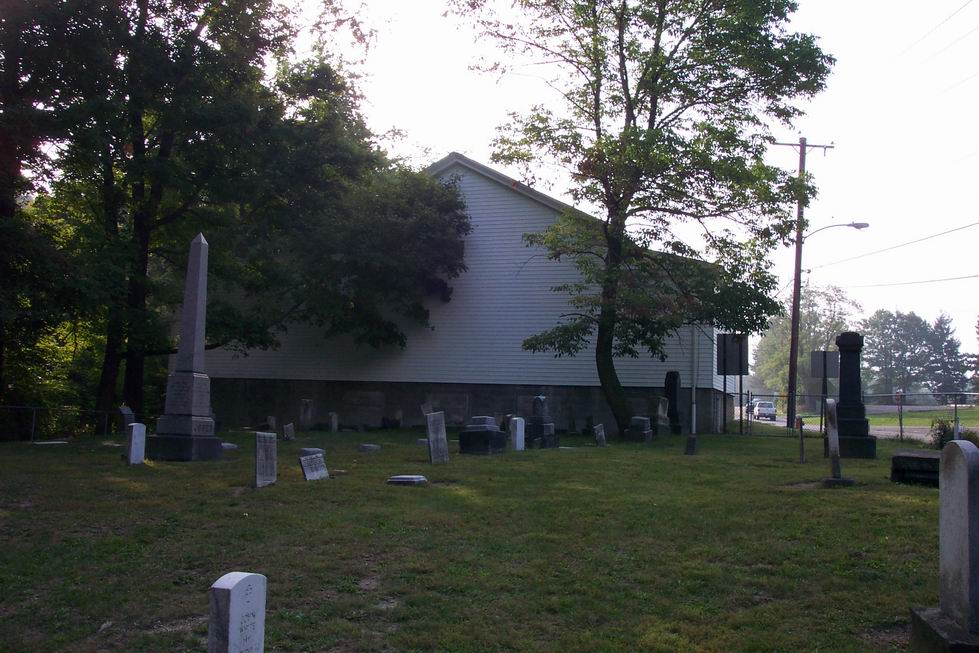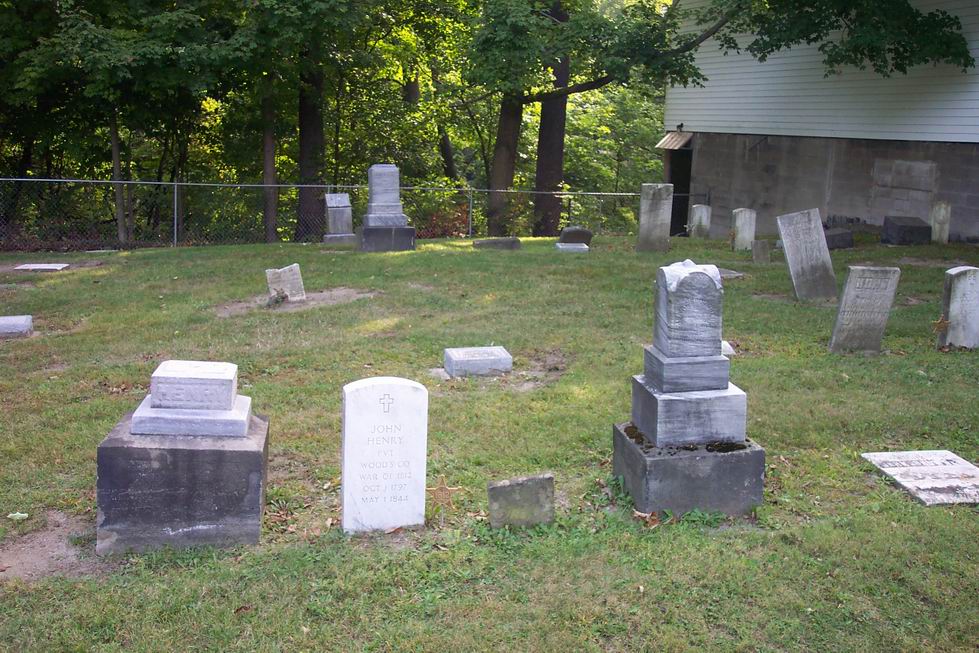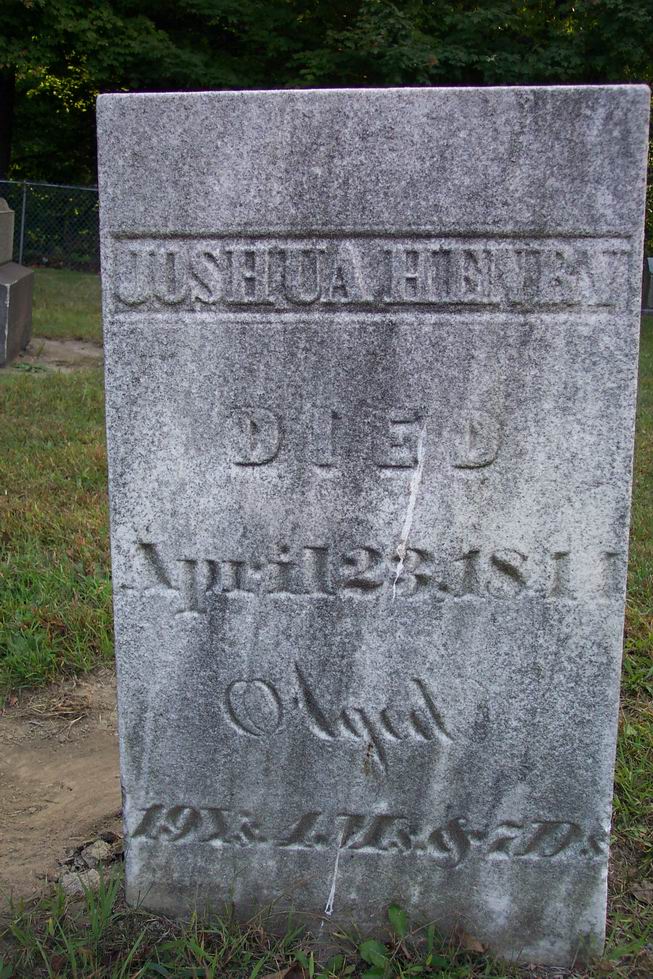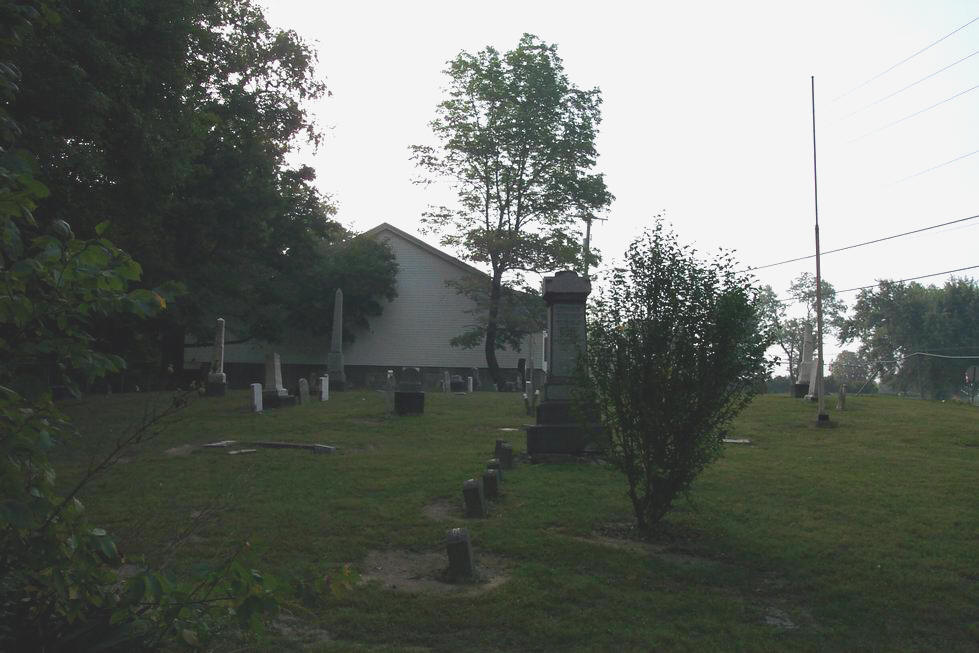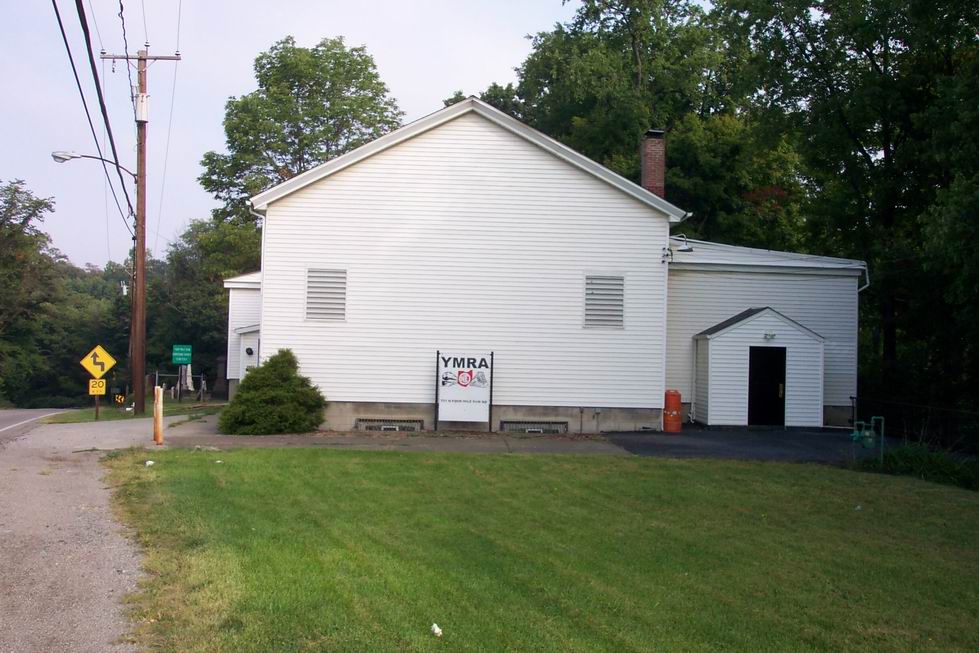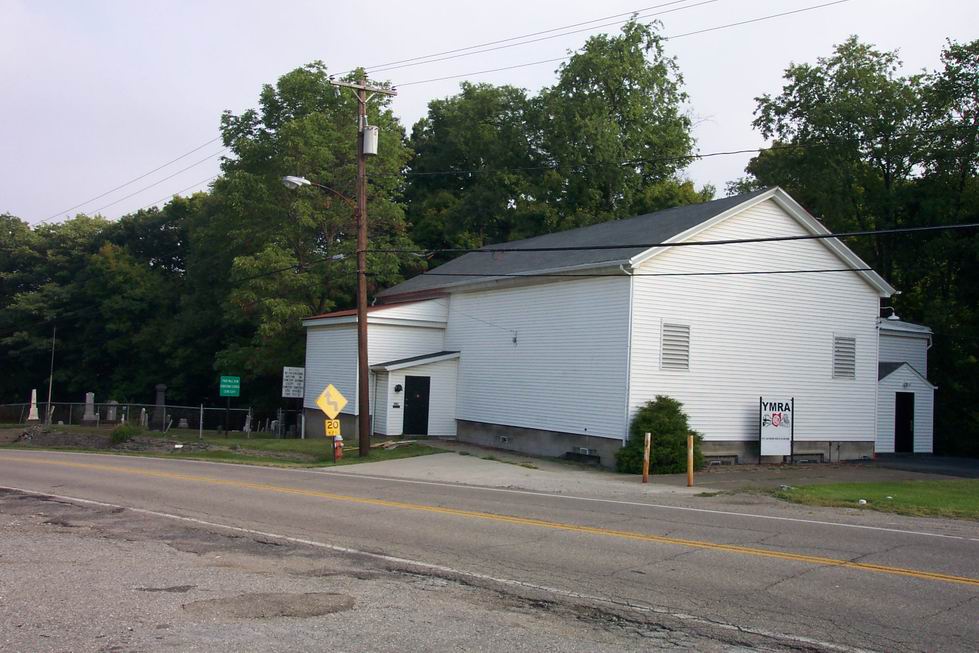John Henry
1797-1844
![]()
The Austintown Church And Life Of John Henry
by A.S. Hayden
The church in Austintown was constituted June 16, 1828. The remains of the Baptist church, once flourishing, lay in a waste and decaying condition over portions of Youngstown and Austintown. In the winter of 1816, a revival occurred under the labors of Elder Joshua Woodworth, a humble and devoted minister. About forty were converted; among the converts were William Hayden, then a youth, and others, still younger, of the same family. The counselors of the church thought it necessary to have the young converts instructed in the “doctrines" of the gospel, “election," and kindred themes. So the faithful minister, loved as a father, was dismissed, and Wm. West was called. He was more learned, but straight, cold, Calvinistic. Under his reign the kingdom was dissolved. Zeal languished under doctrinal sermons. Discipline went by rule rather than by love. Covenant meetings became courts. Appeals were taken, and counsels called. The lambs fled from the fold; conversions ceased; the light grew dim, and the church had but a name to live. Elder West was still in the community when Bro. Scott opened the gospel plea there, and opposed his work.
The following sketch of affairs there is from the pen of Walter Scott:
“When called about two years ago, I found the church in a state of entire prostration. For four years they had not eaten the Lord's Supper; all was delinquency—a perfect web of wickedness, the like of which I never had seen. It was an involved labyrinth of personal and family quarrels. For about three weeks I strove to disentangle the sincere hearted, but in vain. Strife is like the lettings out of water—what is spilt is lost. When the threads and filaments of a quarrel have forced themselves like waves over the whole body ecclesiastic, that body should be dissolved. We accordingly looked upon this institution to be entirely lost, and began to preach the ancient gospel—the word of the Lord as a hammer and a fire. All hearts were immediately broken or burnt; and of that sinful people there have been immersed nearly one hundred and fifty individuals. These have become a church, and are walking in the commandments and ordinances of the Lord, blameless, as I hope. The Scriptures are their sole authority, and they have three bishops, bold in the Lord Jesus, and five deacons.”
The religious awakening which restored the church, or rather built it anew on apostolic foundations, began in Austintown, in February, 1828, soon after the great meeting in Warren. A young man by the name of Asa Jones became serious, and, expressing a wish to become a Christian, Bro. Bentley was sent for. He preached in the school-house where William Hayden was teaching. When the sermon closed, an opportunity being offered, the young man arose, declared his purposes, expressed much joy in believing, and appealed to his friends to follow him to Jesus. Next day, Bro. Bentley preached and baptized this person and eight others. John Henry and his wife were of the number.
Bentley returned home, but a work had commenced which was soon to become wide and general. The converts were clear in their conversion, and active. William Hayden was greatly delighted by the conversion of his particular associate and neighbor, John Henry, a man of great weight in the community, and possessed of abilities, which Hayden clearly foresaw would be likely to turn to much usefulness.
About three weeks after this, Scott sent an appointment to preach in the "Jones' school-house." He came Wednesday the 19th of March. A full house was in waiting. He hurried his audience to the line of decision, classing all the world in two parties—Christ's and the devil's. He laid the foundations of Christ's kingdom in the grand affair of his death, burial, resurrection, ascension, coronation and the inauguration of his reign on earth on the day of Pentecost. Among the startling utterances of that sermon, he said: "We can have a revival of religion whenever we want it! Strange! Strangely marvelous! Differing wide as the heavens from all we had ever heard! Can we obtain this glorious prize—regeneration, pardon, and peace?" Thoughts hurried to and fro, as Scott talked on and showed that Christ's work was finished, his sacrifice complete, the oxen and fatlings were killed, "the table was spread," "all things are now ready," and had been ready for eighteen hundred years—nothing now but for sinners to hear, and come, and, find a welcome to salvation by the Master of the feast.
This was gospel. "Why have I been waiting so long? why has no one ever told me that before?" Thus reasoning and feeling, five came to the decision and yielded. That night the crowd was increased; and next day, March 20th, twelve of us were by his hands lifted into the kingdom.
The whole country was in commotion. Converts came at almost every meeting. But the excitement was to become higher, and to penetrate a new class of society, as I proceed to relate.
Aylett Raines And The Restorationists.
While Mr. Raines was on his tour preaching, and previous to his baptism by Bro. Williams, he came to Austintown. It was in April. He already had a high reputation, especially among the Restorationists, who were numerous. News circulated that he was coming to preach his renunciation of Universalism. A crowd assembled and filled the house. He opened on the mission of the apostles as the embassadors (sic) of Jesus Christ, the authorized expounders of His will. Their preaching was the commission carried out according to Christ's will and intention; as they were not only commissioned by him, but miraculously assisted by the Holy Spirit, so that their preaching, as reported in the book of Acts, is the full, complete, authoritative guide in preaching the gospel, and receiving sinners to the church; that as they, in the opening of their mission on Pentecost, and always afterward throughout the world, preached to the believers that they should repent and be baptized, in the name of Christ, for the remission of sins; this is our model to the end of time, and, consequently, no preaching which differs from this model has any authority in the Word of God. He concluded his long and argumentative discourse in these words:
"My friends, I find myself in a strait; I am shut up in a dilemma; and I can see no way out, with the Word of God in my hand, but through the obedience of faith in baptism. If any of you can see any other, I implore you in the name of my Master to show it to me."
The sensation, which was perceptible in the beginning of the sermon, grew in intensity as he proceeded, till it heightened to a tumult. As soon as the meeting closed, persons who had come in big wagons, and had brought their chairs into the house for seats, jerked up their chairs, started over the benches, and hurried to their homes. The medicine was working. The patients were bilious. The remedy was heroic. Raines was calm. The Disciples were happy. The Universalists, who composed the larger part of the assembly, were disappointed, grieved and chagrined. Their champion had left them and gone over to this new and specious heresy. We can not have it thus; we will not stop and reason calmly with him and show him his error, as he earnestly besought us. "To your tents, 0 Israel!" The very horses felt a touch of the excitement of their drivers!
That discourse worked miracles; that is, if conversion, as we had been taught, was in every case a miracle. It had driven nails in sure places, "as nails fastened by the master of assemblies." Eccl. xii: II. William Hayden preached in the afternoon the same day, and baptized several converts.
The church of Austintown was one of the first in north-eastern Ohio, built on “the foundation of the apostles and prophets, Jesus Christ himself being the chief corner." The day appointed for collecting the disciples as a church of Christ was fair, and a large assembly convened. Scott, Bentley, and Raines were present. After a discourse in the house, we were called out upon the green in front of it. Here all the disciples, one hundred and ten in number, were disposed in a large circle. A space was open on one side of about twelve feet, in which stood the preachers. Thus, each member, with his right hand clasping the left of the one next him, so stood, that he could see all the rest, and also the brethren to whom we owed so much under Christ, and who were, in the most solemn manner, about to form and declare us an organized church. Each of the preachers, in turn, addressed us in the most earnest exhortation, in the things pertaining to the duties of this new relation, while all stood uncovered under the open canopy of heaven. Then followed a prayer by Bro. Scott, imploring blessings unbounded and unending from the divine Head upon every member of his mystic body. Then the hymn: "Lo! he comes, with clouds descending, Once for favored sinners slain," led by Hayden and Henry, was sung with raptures of joy. So began the church of Austintown. It was placed under the care of William Hayden. Bro. Henry was soon called to his side; and not long after, Alexander Spears was chosen also to the eldership.
Biography of John Henry
To few men has it been granted to gain such a celebrity in so short a time as was won by this gifted man. His public ministry was only a little over thirteen years, in which time his personal labors extended from central Ohio to central Pennsylvania, and into Virginia; and his fame spanned the continent. In all that constitutes brilliancy, dash and boldness, he was a very hero. He was born in Chartiers township, Washington County, Pa., October 1, 1797. It is declared of him that he sung tunes when not a year old, but he did not talk till he was four. He came with his father, Francis Henry, to Poland, Ohio, April, 1803. He married Miss Jane Kyle, January 10, 1822; and settled on new lands in Austintown the next spring.
He was a leader in everything he undertook. In the days of military training, he was music-major of regiments. A few blasts of his bugle would start up every soldier, and the exact time of his movement infused martial valor into all around. When he turned to the Lord he quite abandoned this practice, and turned his musical talents, which were of a high order and well trained, to gather and lead the bannered hosts of the Lord. As a farmer he did more work than any other, save one man. He excepted William Hayden. He played on nine kinds of instruments; his favorites were the violin and the clarionet.
He was trained under the strictest rules of Presbyterianism. As the "Christian Baptist” appeared, William Hayden passed the numbers over to the hands of his friend Henry, whose penetrating mind grasped the great principles it unfolded. He was ripened for the sickle of truth, so that when Bentley came, he and his faithful wife were among the converts—the first fruits of a large ingathering. The writer has the most vivid recollection of the scene, as the excellent Bentley, tall and venerable, led this man of commanding form, who stood six feet-two inches, then in his thirty-first year, and laid him beneath the waters of baptism after the example of the Lord.
He gave himself at once to the diligent study of the Bible. He read little else, he studied nothing else; except, perhaps, church history. His taste was for history, and his sermons were largely historic recitals of the life and work of Christ, and the preaching of the apostles, with historic illustration from the Old Testament, delivered in so fresh, forcible, and fluent a style, that as a speaker, few equaled him in instructive and entertaining discourse. But the power of his sermons was much in the authority with which they were spoken. Without any of the studied arts of oratory, he often moved on great assemblies with a mastery that chained attention for two hours. Without rhetoric, his speech abounded in fine tropes, especially in metaphors; and not unfrequently he arose to a pomp of diction equaled only by the finest orators.
In person he was tall, rather spare, with sandy complexion and sharp features, quick in movement, as in the operations of his mind, and when he walked he planted his feet with a tread which showed the firmness of the man. Cheerful, at times almost to levity, very social, kind hearted, and with wit like a polished rapier, whatever "his hand found to do he did with his might." He was in Smithfield, Jefferson County, when he was informed by a special messenger, March 12th, of the supposed fatal sickness of his wife. He would have started after the night meeting for home, but friends interfering, he rested a time. Before day dawned he was in his saddle, and that night, the 13th, he was at home; a distance of seventy miles. The Yellow Creek was so high it nearly swam his horse. He watched his wife most assiduously, and saw her recovery; then fell a victim to the same disease, typhoid fever, after sixteen days' sickness, May 1, 1844.
His work is interwoven with the groundwork of this cause through the whole Western Reserve. Though uncultured, he was not rude. He was high-minded and honorable, and immensely popular with the people. In the early day he and Mr. Campbell met at the Plains Meetinghouse, near Minerva. Many had never seen either of them. Henry preached in the morning, and the people thought it was Campbell. After an interval Mr. Campbell preached, and many of the hearers said: "We wish that man would sit down, and let Campbell get up, for he knows how to preach!"
There was lamentation in all the churches when he died. The feeling is well remembered and distinctly defined. It was less a murmuring, than a deep, sad, silent grief. Bro. Campbell wrote of him at the time: “Bro. John Henry, as a preacher of a particular order of preachers, had no equal—no superior. He was not only mighty in the Scriptures as a preacher and teacher, but was also eminently exemplary in the social virtues of Christianity. His praise is in all the churches in the Western Reserve and circumjacent country.”
He was bold, brave, fearless, cheerful and animated; the life of society, humble, generous, and of unfeigned faith; of great power, of tremendous force, and mighty and eloquent in the Scriptures; he "hewed Agag in pieces, and slew kings in the day of his wrath." All prized and honored him, and the remembrance of him stirs the fainting purpose to unbounded courage. Hundreds yet remember him, as with more prowess than the Knights of St. John, he would return from a successful charge, victor over legions of the king's enemies; and the blasts of his triumph gave courage to all the faint-hearted. Though not always discreet, his bravery was of the first quality. He never lifted his spear but in victory. His enemies gathered near to behold the agile dexterity and massive power with which he felled to the ground the foes of God.
His memory was as capacious as the Mediterranean. Eminently was he, as the orator has it, the “man of one book.” The Bible was his store-house, his treasury, his exhaustless fountain. He read it morning, at noon and night, and all he ever read he remembered. He could repeat it by chapters and by books. It was his book of history, of archaeology, of travels, of biography, of incident, event and anecdote, of moral power and religious persuasion. Nothing in society for which he found not a counterpoint in that Daguerrean gallery of all truth, all duty, all motive.
Brief and brilliant his career. The most loved him—all beheld him with admiration. All love to cherish and honor his memory, while within a narrower circle, sacred and still as where mourners move, he is the idol of an affection next akin to the feeling that worships.
Forty-seven years the church in Austintown has stood against all the forces arrayed against it. It has never ceased to meet, except by voluntary adjournment, to attend the yearly meetings. Under the wise and careful eldership of Bro. Ira McCollum, one of its charter members, and Bro. Joshua Kyle, who for many years have held the helm, she has kept her course steady and constant toward the harbor.
—History Of The Disciples In The Western Reserve, A. S. Hayden, pages 127-137.
![]()
John Henry's Part In Dissolving The Mahoning Baptist Association
When Alexander Campbell and the church at Brush Run left the Redstone Baptist Association in 1823, they joined themselves with the Mahoning Baptist Association. The Mahoning Association had begun three years previous with at least six known churches, and a few others perhaps that were located in the Northeastern part of the state of Ohio.
Over the next few years of the Association, new churches were planted in the area, and were added to the roster of churches that were a part of it. One such group, under the preaching of Walter Scott, in 1827 was the church at Austintown, Ohio. Some of its earliest converts to the ancient order of things were men like William Hayden and John Henry. They both were preachers of power and resourcefulness.
Within the next three years, the churches became less and less identified with orthodox Baptist theology. Even the concept of an Association with any kind of ruling authority became less and less acceptable in the minds of its constituents. Most of their preachers tended to preach against the theology that brought the Association together in the first place. By 1830, the churches of the Association were Baptists in name only. That year the meeting of the association was held at the church in Austintown, Ohio. The first day of the meeting was spent in evangelistic preaching, singing, fellowship, and reporting on the work. The following day at the private encouragement of Walter Scott, John Henry put forth the following resolution: "Moved—That the Mahoning Association, as an advisory council, or ecclesiastical tribunal, should cease to exist." Though Alexander Campbell had been a strong influence in directing the thoughts of leaders to move to this point, such a decision startled him initially. He stood to challenge the resolution, but Walter Scott putting his hand on his shoulder, encouraged him to allow the resolution to stand. The resolution was passed unanimously. Campbell then rose to ask, "Brethren, what are you going to do? Are you never going to meet again?" The reaction of the group was like a "clap of thunder." It caused some to change their feelings about their decision. Then Campbell suggested that the group continue to meet annually for fellowship, preaching and reporting on the work. This was readily accepted among the group, and with it the dissolving of the Mahoning Baptist Association. So, with the fall of the Association system of organization, it gave rise to a new approach to unity among Disciples' churches—the Yearly Meeting, or annual meetings of churches.
John Henry's ministry was cut short due to the illness that brought about his death at the early age of forty-six. Had he lived a fuller life, perhaps history would remember him as a more outstanding mover and promoter of the ancient order in the early days of the Restoration Movement in America. Lest he be overlooked entirely, some things should be remembered. He was one of the earliest among the people of Ohio to be baptized for the remission of his sins. He traveled with Alexander Campbell, Walter Scott and William Hayden to preach among churches of the Western Reserve, and preached with conviction the power of the cross. He was known throughout the brotherhood as, "The Walking Bible," because of his ability to quote most all the New Testament. He was a debater, willing to meet anyone on the polemic platform. He participated in at least six known debates.
As the years since his death are now long past, the dust that once made up the body of this great soldier of the cross still lies in the cemetery behind the Four Mile Run Christian Church in Austintown, Ohio.
—Sources Include Buckeye Disciples,
by Henry K. Shaw, and Walter Scott: Voice Of The Golden Oracle, by
Dwight Stevenson
![]()
CHAPTER XV. BENTLEY, HENRY, RAINES, HAYDEN.
A group of strong men were gathered about Walter Scott on the Western Reserve, Ohio, to whom we owe much. Adamson Bentley was one of these pioneers. He was born July 4, 1785, in Allegheny county, Pa. His father moved while he was yet young to Trumbull county, Ohio. He confessed Christ and was baptized and at the age of nineteen began to preach. With great fidelity he taught Calvinism as the Gospel. He carried this system in his head and the love of God in his heart. At a great yearly meeting in 1837 he said: "I used to take my little children on my knee, and look upon them as they played in harmless innocence about me, and wonder which of them was to be finally and forever lost ! It cannot be that God has been so good to me as to elect all my children! No, No! I am myself a miracle of mercy, and it cannot be that God has been kinder to me than to all other parents. Some of these then must be of the non-elect and will be finally banished from God and all good. And now if I only knew which of my children were to dwell in everlasting burnings, oh! how kind and tender would I be to them, knowing that all the comfort they would ever experience would be here in this world! But now I see the Gospel admits all to salvation I Now I can have hope of everyone for eternal happiness! Now I can pray and labor for them in hope.'"
In 1810, he settled in Warren, and was ordained and took charge of the church. He was an excellent preacher and a man of great social influence. He was present at the formation of the Mahoning Association, and his ability as a preacher, and tact and dignity as a presiding officer, rendered him one of its prominent members during its entire existence. Tall, manly, graceful, dignified, eloquent and honest, he had great power with the people. He traveled extensively in Kentucky and Pennsylvania, crossed the mountains many times in his saddle, and was constant in labors. When the great principles advocated by Campbell began to make a stir he was one of the first to accept them and boldly seconded Scott when he came to Warren, and the whole church adopted the plan of Union contained in the New Testament. In 1831, he moved to Chagrin Falls. He preached until 80 years of age, and no man in Northeastern Ohio possessed the influence wielded by this princely man.
John Henry was another of this group, perhaps the most brilliant and gifted. His ministry lasted only about thirteen years. He was a native of Allegheny County, Pa. It was said of him that he sung tunes when not a year old though he did not talk until four years of age. He was a skillful musician, playing nine different instruments, and composing music with ease. His religious training had been in the Presbyterian faith. The Christian Baptist changed him, he was immersed by Bentley, and in. his 31st year gave himself to preaching the Gospel. He was a plain farmer, and among the common people he had great influence. He was full of the divine Word and was called often the " Walking Bible" or the " Bible with a Tongue.'' Often without any of the studied arts of the orator he moved great assemblies with a mastery that chained attention for two hours at the time. He was tall, six feet and two inches, spare, of sandy complexion and sharp features, quick in his movements and in the operations of his mind, social, kind-hearted, and of a keen and ready wit. Henry's work was felt throughout the Western Reserve. At an early time preaching with A. Campbell near Minerva, many people who had never seen either of the speakers, heard him in the morning and thought it Campbell. After an interval Campbell preached, and many of his hearers said: "We wish that man would sit down and let Campbell get up for he knows how to preach." He was a man of One Book. Mr. Campbell said of him: "As a preacher, of a particular order of preachers he had no equal—no superior. He was not only mighty in the Scriptures as a preacher and teacher, but was also eminently exemplary in the social virtues of Christianity.” He died May 1, 1844, universally mourned.
Aylette Raines was born near Fredericksburg, Va., in 1797. He was christened in the Episcopal Church at four years much against his wishes. His parents emigrated to Ohio when he was fourteen years of age. He became skeptical from reading Paine's "Age of Reason," but his mother's pious teachings held him He went to Indiana and engaged in teaching. There he fell in with the Restorationists and adopted their views. "I got religion," he says. "I underwent a great moral change. There was much of the love of God in it. Shrouded as I was in error, yet there were apertures through which the love of God passed through into my heart and made me inexpressibly happy. I now commenced the study of the Scriptures in good earnest and after two years began preaching."
He came in contact with Scott and others preaching the ancient Gospel. Hundreds were being baptized. He concluded to hear Scott for himself. One object he had in view was to bring Scott into debate. In the first sermon he heard, Scott stated what he called "the six points of the Gospel." Greatly amazed and confounded he feared to oppose him lest he should expose himself. The discourse seemed invulnerable. He said, "I can do nothing against the Gospel preached by Scott unless I should live to disgrace it which the Lord forbid."
The next day Raines heard Scott again. His subject was the resurrection. Again he was amazed. Then he heard him on the two covenants and then on the eleventh of Hebrews. Here he surrendered. Scott convinced him that he should lay aside his philosophy and preach the Gospel as the apostles proclaimed it and he began at once to bear his testimony for the truth. When his case came before the Association at Warren in 1828 it was claimed by some that Raines still held his Restorationist opinions, and should not be admitted. Campbell preached on Rom. 14, defining the difference between faith and opinion. It was agreed that if Raines expressed his willingness to preach the Gospel as the apostles preached it, and to retain his opinions as private property, in harmony with the principles of the Reformation there would be no objection. It gave an example of freedom of thought unknown under the creeds and a striking illustration of the liberality of the basis of Christian union advocated by the Reformers.
After the union of the followers of Stone and Campbell, Aylette Raines went to Kentucky and assumed charge of the united churches at Paris where he remained for twenty years and "by his steady unremitting labors and able advocacy of the Reformation principles greatly extended their influence," says Dr. Richardson.
William Hayden is another of this historic group. Born in Westmoreland county, Pa., on the Lord's Day, June 30, 1799, his family removed to the wilds of the new state of Ohio, in 1804, and settled in Youngstown. He struggled with doubt and Calvinism until sixteen and finally fled for refuge to the hope of the Gospel and was baptized May, 1816, uniting with the Baptist Church. In October, 1821, he heard A. Campbell in Warren. "He was then thirty-three years of age," says Hayden, "the sharpest man I ever saw both in appearance and in intellect. His first sermon was from the text 'Thy Kingdom Come.' I soon saw what he meant to make out and I did not intend to believe him, but I could not help believing him." In 1828 he heard Walter Scott, and his direct method of calling sinners to obedience seemed to him rash and dangerous. Hearing Scott again, his first words were, "There is not a man in this house who believes that God means what he says." Then he went on to show that men came to the Bible with their heads full of religious systems and theories and dared not take the Scriptures in any sense inconsistent with these theories less their religious systems be endangered. He vindicated the authority of God's Word as against every system and exalted its sufficiency, truthfulness, and trustworthiness, showing the propriety of relying upon the divine declarations alone, in which the terms of salvation were presented to us for our immediate acceptance.
A complete revolution was wrought in the mind of Hayden. The Bible became to him a new book. The Gospel was a simple development of God's love, and the power of God unto salvation to everyone that believed it, and it was no longer a mockery to preach, pretending to offer salvation to all, yet announcing that this was nevertheless reserved for a definite, pre-ordained number known only to God.
Hayden accepted this position and was ordained by Scott and Bentley. His labors from that time were double those of most men, working with his hands as much as other men and yet more in the saddle than most preachers. For twenty-five years he was absent from home 240 days and nights out of 365. He was incessant in preaching, teaching and conversation, public and private; creating openings and occupying them, and when others could be found to occupy them, going forth to break new ground. He, with his brother, A. S. Hayden, projected the Eclectic Institute, now Hiram College, and he had much to do with the origin of the Ohio State Missionary Society. In 1832 he visited New York, and made many tours in New York, Pennsylvania, Virginia, Michigan, Wisconsin, and even Canada. During his ministry of thirty-five years he traveled 90,000 miles, 60,000 on horseback, a distance of twice that of the earth's circumference; preached 9,000 sermons, or 260 a year; and baptized 1,250 persons with his own hands.
He had the gift of song. People would come out to Scott's meetings to hear William Hayden sing. He was full of song and full of songs suited to every condition. Scott said, "Give me my Bible, my head, and William Hayden, and we will go out and convert the world! " He died at Chagrin Falls, April 7, 1863.
-Frederick D. Power, Sketches Of Our Pioneers, c.1898, by J.Z. Tyler, Fleming H. Revell Company, Chapter 15, pages 103-112
![]()
Directions To The Austintown Church & Grave Of John Henry
Austintown, Ohio is a suburb township of Youngstown, Ohio. From Youngstown head northwest on I-680. Just before reaching I-80 take Exit 2 (N. Meridian Rd.) and go south. Go about 1/4 mile and turn right on Crum Rd. At the end turn right on N. Four Mile Run Rd. and the church and cemetery will be on your right. Church is actually located at the crossroads of N. Four Mile Run Rd., Raccoon Rd., and Lanterman Rd.
GPS Location of grave
41°07'12.2"N 80°43'55.1"W
or D.d. 41.120050,-80.731983
Accuracy to 16' / Grave Faces West
![]()
Four Mile Run
Christian Church
Cemetery
John Henry
PVT
Woods Co.
War Of 1812
Oct 1, 1797
May 1, 1844
Joshua Henry
Died
April 23, 1811
Aged
19 Ys. 4. Ms. & 7 Ds
Four Mile Run Christian Church
![]()
